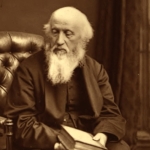Look! From my window there’s a view
of city streets
where only lives as dry as tortoises
can crawl—the Gallapagos of desire.
There is the day of Negroes with red hair
and the day of insane women on the subway;
there is the day of the word Trieste
and the night of the blind man with the electric guitar.
But I have no profession. Like a spy
I read the papers—Situations Wanted.
Surely there is a secret
which, if I knew it, would change everything!
2
I have the poor man’s nerve-tic, irony.
I see through the illusions of the age!
The bell tolls, and the hearse advances,
and the mourners follow, for my entertainment.
I tread the burning pavement,
the streets where drunkards stretch
like photographs of civil death
and trumpets strangle in electric shelves.
The mannequins stare at me scornfully.
I know they are pretending
all day to be in earnest.
And can it be that love is an illusion?
When darkness falls on the enormous street
the air is filled with Eros, whispering.
Eyes, mouths, contrive to meet
in silence, fearing they may be prevented.
3
O businessmen like ruins,
bankers who are Bastilles,
widows, sadder than the shores of lakes,
then you were happy, when you still could tremble!
But all night long my window
sheds tears of light.
I seek the word. The word is not forthcoming.
O syllables of light ... O dark cathedral ...


















Comment form: